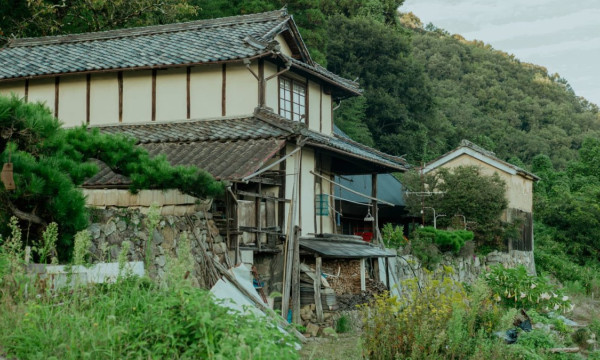Foreign buyers eye Japan's 'empty houses' with millions available for cheap -- but experts warn of risks

Purchasing a house might seem like a task, in many regions struggling with a housing shortage; however Japan stands out as having an abundance of available properties instead.
In 2023 according to records, from the government of Japan over 9 million empty houses "akiyas' were reported with certain properties priced below $10 000.
In both regions and bustling urban centers lay these houses that have been deserted and uninhabited for long periods of time. Presenting an exclusive chance for purchasers, with imaginative visions.
The increase in abandoned homes in Japan can be mainly attributed to a population crisis due to a decline in the fertility rate to a historical low of 1· 3 births per woman by 2023 as death rates outpace birth rates with the growing elderly population, in Japan.
"The issue of abandoned homes has been growing over the years and is deeply connected to Japans growth after the war era when there was a significant increase in building new houses " shared Tetsuya Kaneko from Savills Japan in a conversation, with CNBC Make It.
Kaneko mentioned that the problem became more noticeable during the 1990s to Japans economic downturn and has since deteriorated with the ongoing demographic shifts.
Urban migration plays a role in the increase of abandoned houses in Japan as younger individuals relocate to urban areas for employment opportunities while older residents in rural areas struggle to upkeep their homes due to factors, like aging or financial constraints.
Local residents frequently view akiyas in a light and consider them burdensome " mentioned Kaneko."Therefore even if offspring inherit their elderly parents family residences they often hesitate to either utilize or sell the property themselves resulting in an increase of unoccupied houses, in the real estate market."
Kaneko mentioned that a house than 30 years is commonly seen as aged by locals due to worries about safety concerns and costly renovations as well as potential decay issues. There's also a superstition, among some individuals associating these homes with being haunted or bringing ill fortune.
According to Michael from the Cheap Houses Japan blog featured in CNBC Make It's report many Japanese individuals view akiya as assets that lose value and cause problems than they are worth, in the end."
"The expensive properties have their reasons " he mentioned; it could be due, to the undesirable location or the anticipated renovation expenses surpassing the propertys value.
Overseas buyers are showing interest, in Japans akiyas.
Kaneko mentioned a growing trend of inquiries and a rise, in interest and purchases of akiyas recently.
Kaneko mentioned that the increasing foreign interest in estate, in Japan is fueled in part by the impact of the pandemic and changing work patterns and lifestyle choices.
He mentioned that an increasing number of individuals. From investors to retirees in search of a getaway. Are interested in acquiring second homes, for vacations or renovation ventures.
Lets consider Anton Wormann as an example. He developed an affection for Japan while on a business trip there. Originally, from Sweden. Having traveled extensively worldwide in his twenties as a model before moving to Japan in 2008 at the age of 32.
"I resided in New York for two years before traveling extensively throughout Europe... Hence I am quite familiar, with the cost of living in major metropolitan cities " Wormann shared with CNBC Make It."Its simply not feasible for me to afford a home in any of the locations where I have previously resided."
Upon learning about Japans affordable housing market he made the decision to buy his place there. Six years on Wormann is the proud owner of seven akiyas juggling roles as both a content creator and real estate investor, in Japan.
Hes done fixing up three of his properties. Is now focusing on completing the remaining four renovations, in progress. Today marks a milestone as one of his properties. Acquired and revamped for approximately $110k. Generates a monthly short term rental income of $11k.
"Wormann responded affirmatively and negatively."
He mentioned that his investments now generate a six figure income annually thanks, to his dedication to learning about culture and language and connecting with the people there.
"Wormann emphasized the importance of building a community and social network in Japan for success " he said. "It's crucial to grasp the culture and workings of Japan of solely relying on financial investments to avoid falling into a bottomless pit of expenses."
"If you want to fit in and do it properly " Wormann mentioned that there's ample potential, for that approach and even a chance to invest in affordable properties for personal use."
"Experts are in agreement, with this feeling."
"Akiyas have the potential to be an investment for specific demographics such as enthusiasts in hobbies or DIY projects or individuals looking for a peaceful escape, in the countryside " Kaneko stated.
"He mentioned that they might not be suitable for institutional investors or individuals seeking substantial profits because of the expensive renovation expenses and restricted resale opportunities, in certain locations " he noted while also pointing out that scalability could pose a challenge.
Kaneko emphasized the need to anticipate expenses when dealing with extensive structural repairs for a house and highlighted the intricacies involved in purchasing a home due, to language barriers and the challenges of dealing with local authorities.

Dominic Maley is an American journalist recognized for his sharp and insightful reporting on social and political issues. His work is known for its depth, integrity, and the ability to highlight critical societal concerns.